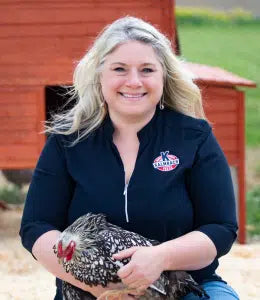Conventional vs Organic vs Non-GMO Chicken Feeds

Choosing the right feed for our fluffy, feathered chickens and ducks can sometimes seem overwhelming. There are a lot of options today. Understanding the nuances of the different feed terms can often make your decision easier.
Conventional Feed
The majority of the feed available today is made from grain and protein sources that are grown using conventional farming practices. Farmers are able to choose the inputs that work best for their farms, their land, and their management practices. The seedstock used to grow these crops may or may not be genetically modified and the farmers can use any input (fertilizer, herbicide, pesticide, etc.) that is approved for agricultural use and meets the needs of their crops and their land. Conventionally-grown crops are typically less expensive to purchase and are widely available, which makes them a very popular option.
What is a GMO?
GMO stands for Genetically Modified Organism. We can get into a spirited debate about what “genetic modification” actually means, but, for the purpose of this article, it will mean seedstock that has had the genetic material modified in a laboratory setting.
Non-GMO feeds are made using grain and protein sources that are grown using non-GMO seedstock. Some crops are inherently non-GMO (e.g., all wheat is non-GMO) and some crops are available in both non-GMO and GMO varieties.
There are currently 13 genetically modified foods available in the United States. Common crops include corn, soybeans, cotton, canola, alfalfa, and sugar beets. Other genetically modified foods include some varieties of summer squash, papaya, apple, eggplant, pineapple, potatoes, and salmon. The most common genetic modifications are herbicide-tolerant (HT) crops and insect-resistant crops. Glyphosate-resistant (RoundUp Ready®) seed is arguably the most widely recognized genetic modification.
Is Non-GMO and Organic the Same Thing?
No. Organic is non-GMO but non-GMO is not organic.
Farmers that grow non-GMO crops are required to use non-GMO seedstock. However, there are no restrictions on the other inputs (fertilizers, pesticides, herbicides, etc.) that can be used on their land or in the management of their crops.
Farmers that grow certified organic crops for feed and food are also required to use non-GMO seedstock. Moreover, these farmers are very limited in the inputs (fertilizers, pesticides, herbicides) that can be used on their land or in the management of their crop. Anything added to the soil or used on the crops must also be part of the USDA’s National Organic Program (NOP) and is tightly controlled. Common chemical fertilizers, pesticides, and herbicides would not be allowed.
If the use of GMOs is your primary concern, then both non-GMO and organic feeds are good options for you. If the use of pesticides or herbicides (i.e., glyphosate) is your primary concern, then choosing an organic feed is the best option for you.
What Makes a Chicken Feed Organic?
Now that we have covered the basics about growing organic crops, let’s talk about what makes a feed organic. To be USDA-certified organic, a farmer or a feed mill must be inspected and certified through an agency that specializes in organic certifications. Farms must be managed without the use of prohibited inputs (e.g., synthetic herbicides) for a full three years before they can be certified organic. Feed mills making certified organic feed must buy ingredients only from USDA-certified organic farmers and are required to keep extensive records to be used during organic inspections. Choosing a supplier that takes the extra steps to become USDA-Certified Organic ensures that you can trust that your feed is exactly what you expect.
Is Organic Chicken Feed the Same as All Natural Chicken Feed?
No. Organic and All Natural are not the same thing. At Kalmbach Feeds, we have an excellent line of All Natural poultry feeds. However, these feeds are often not organic. All Natural is a term that can mean different things to different companies. At Kalmbach Feeds, All Natural means No Antibiotics and No Animal By-Products. These feeds could be made with conventional, non-GMO, or organic ingredients. Whenever you aren’t sure, never hesitate to reach out to your supplier and ask.
Where Can I Get Conventional, Non-GMO, or Organic Feeds?
At Kalmbach Feeds, we truly do have an option for every customer. We have complete lines of conventional, all-natural, non-GMO, and USDA Certified Organic poultry feeds. No matter what your goals are for your farm or your flock, we can help you meet those goals!
Keeping poultry is such a wonderful experience and the rewards are many! At Kalmbach Feeds, we are always here to help. If you have any questions about the nutrient needs of your birds, feed options, or general poultry keeping, please let us know. We are so excited to continue writing about all the topics that are important to you, and can’t wait to continue learning about your flocks. Stay tuned and thank you for choosing Kalmbach Feeds!
